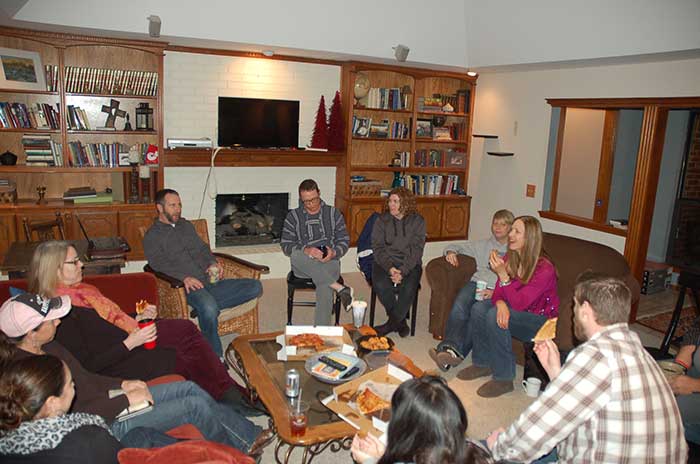Our Lord’s Community Church (RCA) in Oklahoma City, Oklahoma, is making discipleship a group effort. Through its “D-groups” (D for discipleship), which typically spring from “C-groups” (C for community), the church is challenging members to deepen their faith and reach out to others.
And there’s been enough fruit in the experience that the church is now working with other congregations in Central Plains Classis to help them improve disciple-making.
One of the C-groups from Our Lord’s Community Church.
Discipleship effort moves beyond “just going to church”
Our Lord’s Community Church (RCA) in Oklahoma City, Oklahoma, is making discipleship a group effort.
Through its “D-groups” (D for discipleship), which typically spring from “C-groups” (C for community), the church is challenging members to deepen their faith and reach out to others.
And there’s been enough fruit in the experience that the church is now working with other congregations in Central Plains Classis to help them improve disciple-making.
“What we’re looking for is to help people move from just going to church to living for God,” says lead pastor Roc Bottomly, “helping them to grow personally while giving them a tool to help others.”
The more traditional community groups (from six to 15 people) are places for mutual encouragement and fellowship, broadening relationships, and incorporating newer church members. Often children are part of group activities.
The smaller discipleship groups (with two to six people) are places for Scripture reading, sharing, and prayer.
“The D-group is the primary discipleship engine of the church,” says John Riner, whose chief role as adult discipleship pastor is supporting the network of groups. C-groups, he says, are about finding family, while D-groups are about finding “spiritual workout partners.”
Simple and reproducing
Bottomly emphasizes the ease in being part of—or even leading—a D-group. There is no outside preparation other than one’s own daily devotional readings. “All it takes to lead one is a willingness to invite friends and go first,” he says.
Many church members are following “The Journey,” a chapter-per-day Scripture reading program with prayer and reflection. One of the chapters becomes the focus of a D-group session, convened in a home, office, coffee shop, or at church. The format is “up, in, and out.”
- Up: Reading the Scripture and journaling.
- In: Relational sharing of life questions and prayer for each other in putting God’s Word into practice.
- Out: Who does God want you to “touch” or share Jesus with this week? Prayers are offered toward that end.
Following Jesus’ approach
“We’re not being trendy or cutting edge with this, but just looking at Jesus’ way of making disciples in a scale-able, sustainable way,” Riner says. “Jesus met with the 12 disciples, but also had an inner circle relationship with three [with] whom he shared more in intimate times and places.”
“My experiences in D-groups have been extraordinary,” says Joe Hill, a participant for more than three years. “The mentoring, devotion, and prayer times have been encouraging and drawn me close to Christ, and I believe it’s an integral part of the strength of our community of believers.”
Our Lord’s Community has about 17 C-groups and three dozen of the smaller D-groups. Most of the worshiping population of about 300 is in C-groups. Our Lord’s Community’s youth programming includes similar small-group dynamics.
Noticeable growth
“We’ve been doing this for about five years now and found it helpful, nourishing, and bonding,” says Bottomly.
“This process connects people firsthand and gets them reading the Bible and listening—getting the Word to function in their lives, with prayer and companionship.
“Telling people about yourself and being open and honest makes you feel safe and at home with them. Through the group many people have begun to have a daily time with God. When people do that, there is noticeable growth.”
Learning communities are now forming to help congregations develop discipleship pathways and transformation processes. Learn more: transformation@rca.org.
Thank God for the ways people are connecting with God and with each other through small groups. Pray for people in your congregation in small groups.
Support initiatives like the leadership community that Our Lord’s Community Church is a part of with a gift to the RCA Ministry Fund: www.rca.org/ministryfund.





